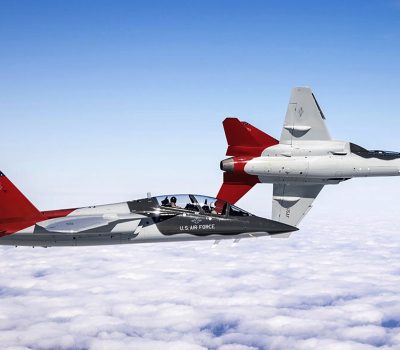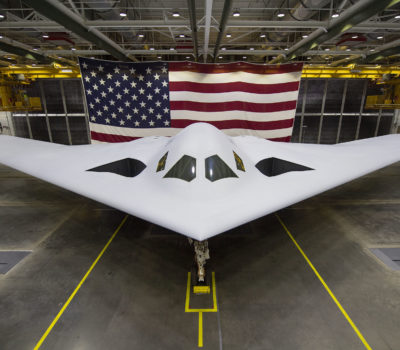Radar Sweep
Air Force Looks to Cut Nearly 50 Percent of Tactical Air Control Party Jobs
The Air Force is set to shrink its elite corps of tactical air control party Airmen by nearly half over the next three years, Air Force Times has learned. Downsizing the cohort is among the Air Force’s latest steps to pivot toward the Indo-Pacific after 20 years of more traditional air-ground wars in the Middle East. TACPs deploy with Army and special operations units and act as liaisons between forces on the ground and those overhead.
Go Deeper on Operational Imperatives
Air Force Secretary Frank Kendall has defined seven Operational Imperatives for the Department of the Air Force to work on, warning that “if we don't get them right, we will have unacceptable operational risk.” From a resilient space order of battle to the development of next-generation tactical air dominance and global strike platforms, these imperatives will define the Air Force for decades to come—Dive deeper into each one with our new “Operational Imperatives” pages highlighting all the latest news and developments on these critical efforts.
Pentagon, Intelligence Agencies Face Calls for Details on Leak Probe
U.S. Defense Department and intelligence agencies face growing calls from lawmakers for details about how a 21-year-old Air National Guardsman was allegedly able to access and post online classified information. Senior lawmakers with oversight of intelligence and defense on April 16 said they don’t yet understand how a low-level information technician was allowed access to the classified documents and allegedly to sneak state secrets out of secured facilities. Some lawmakers also called for officials to be held accountable for the breach.
Pentagon Lags on Software-Buying Reforms, GAO Says
The Defense Department continues to emphasize rapid software acquisition and agile development to keep pace with near-peer competitors Russia and China, but a new Government Accountability Office report issued April 13 found that the bulk of the recommendations meant for achieving those goals remain unimplemented.
China Vows Not to Sell Arms to Any Party in Ukraine War
China won’t sell weapons to either side in the war in Ukraine, the country’s foreign minister said April 14, responding to Western concerns that Beijing could provide military assistance to Russia. China has maintained that it is neutral in the conflict, while backing Russia politically, rhetorically, and economically at a time when Western nations have imposed punishing sanctions and sought to isolate Moscow for its invasion of its neighbor.
PODCAST: Spacepower Security Forum: Key Takeaways
In Episode 124 of the Aerospace Advantage, Doug Birkey chats with Tim Ryan and Charles Galbreath of Mitchell Institute’s Spacepower Advantage Center of Excellence about the second annual Spacepower Security Forum. Chief of Space Operations Gen B. Chance Saltzman talked about “Competitive Endurance,” Lt. Gen. DeAnna M. Burt discussed critical missile warning and tracking missions, and Maj. Gen. David N. Miller talked over how to protect and defend space capabilities. Tim, Charles, and Doug discuss what the speakers had to say and why it matters.
New Reports Explain Why Security in Space Is Fragile
As more nations seek to explore the vast expanse of space, there is increasing competition and congestion in orbit, according to two new reports released April 14. The Secure World Foundation (SWF) and the Center for Strategic and International Studies (CSIS) published their annual assessments of global anti-satellite weapons, which are based on open-source information.
Pentagon Aims to ‘Own the Technical Baseline’ for AI Tech, R&D Official Says
Within “weeks” invitations will go out to key figures in defense, industry, and academia for a first-of-its-kind Pentagon-hosted conference on “trusted AI and autonomy,” one of the lead organizers told Breaking Defense in an exclusive interview. The crucial question: Can the Defense Department rely on AI across a host of future missions?
DOD Seeks Greater Rapid Prototyping Authority from Congress
The Pentagon, citing the need to maintain technology overmatch with China, wants to empower military service secretaries to initiate their own weapons development programs without wading through the traditional budget and acquisition oversight process, according to a new legislative proposal sent to Congress.
South Korea to Develop Electronic Warfare Aircraft, Buy Helicopters
South Korea’s defense procurement agency has approved two major acquisition programs, paving the way for the country to develop a new electronic warfare aircraft and buy new heavy-lift helicopters. The Defense Acquisition Program Administration announced April 13 its approval of a $1.41 billion program to develop a new airborne electronic warfare platform. The project is expected to run from 2024 to 2032, and the new aircraft will seek to improve joint operational capabilities and the survivability of the country’s air assets by jamming and disrupting adversarial air defenses as well as command and communications systems.
Air Force Recognizes Lance P. Sijan Award Winners
The Air Force recognized the Lance P. Sijan Leadership Award recipients from 2019 to 2022 during an award ceremony at the Pentagon, Arlington, Va., April 3. Air Force Chief of Staff Gen. CQ Brown, Jr., spoke about the prestigious award, highlighting the accomplishments of the Airmen who embody Sijan’s leadership and character in performance and standards of personal conduct. “Your acts of courage and inspirational leadership is why we are all here today,” Brown said during the ceremony. “You carry on a legacy of courage, resilience, and dedication to duty that Capt. Sijan stood for.”



